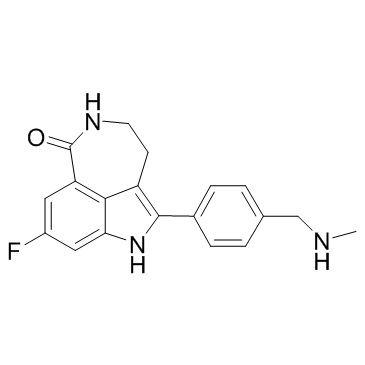Pronunciation roo-KAP-ə-rib Routes ofadministration By mouth (tablets) Legal status US: ℞-only | Trade names Rubraca ATC code None | |
 | ||
Bioavailability 30–45% (Tmax = 1.9 hours) Route Oral administration (Tablet) | ||
The clinical activity of rucaparib in patients with ovarian cancer
Rucaparib (brand name Rubraca roo-BRAH-ka, code name AG 014699) is a PARP inhibitor being investigated as a potential anti-cancer agent. Rucaparib is the first-in-class clinical candidate targeting the DNA repair enzyme poly-ADP ribose polymerase-1 (PARP-1), and was first synthesised as part of a collaboration between scientists working in Northern Institute of Cancer Research and Medical School of Newcastle University, alongside Agouron Pharmaceuticals (San Diego). It is being developed by Clovis Oncology.
Contents
- The clinical activity of rucaparib in patients with ovarian cancer
- Patients with ovarian cancer likely to respond to rucaparib using tumor genetic analysis
- Biological effects
- Mechanism of action
- Clinical trials
- References
In December 2016 U.S. FDA granted an accelerated approval for use in cases of pretreated advanced ovarian cancer.
It can be taken orally in tablet form. It is a benzimidazole derivative (being a 1H-benzimidazole-4-carboxamide).
Patients with ovarian cancer likely to respond to rucaparib using tumor genetic analysis
Biological effects
Rucaparib inhibits "the contraction of isolated vascular smooth muscle, including that from the tumours of cancer patients. It also reduces the migration of some cancer and normal cells in culture."
Mechanism of action
As a PARP inhibitor it is expected to be more effective in cancers with a BRCA mutation (BRCA1 or BRCA2), e.g., about nine percent of pancreatic patients are BRCA1/BRCA2 positive.
Clinical trials
It has undergone phase I clinical trials for patients with advanced solid tumours. It is in phase II clinical trials for metastatic breast and ovarian cancer with known BRCA1 or BRCA2 mutation.
It is thought that 20% of women with ovarian cancer who are not BRCA positive might also benefit from PARP inhibitors.
As of April 2016 the ARIEL3 phase III clinical trial for maintenance after platinum-based chemotherapy for serous and endometrioid ovarian cancer is active.
As of June 2016 six clinical trials of rucaparib were active.
June 2016 some encouraging results from a small early trial on BRCA1/2 positive pancreatic cancer were announced.
On 19th December 2016 FDA granted an accelerated approval for treatment in cases of pretreated advanced ovarian cancer based on data from 106 patients across 2 trials.
